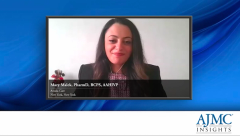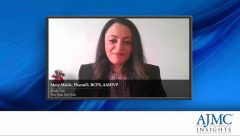
Diagnosing HIV During COVID-19
Episodes in this series

Health care provider Moti Ramgopal, MD, FACP, FIDSA, comments on key considerations when approaching a new diagnosis of HIV and challenges he has encountered during the COVID-19 pandemic.
Transcript:
Moti Ramgopal, MD, FACP, FIDSA: Pre-COVID-19, [coronavirus disease 2019], we had a clear-cut system for how we address the patient who's newly diagnosed. It's important if someone is newly diagnosed to have them in the clinic, sit with them, reassure the patient of the HIV diagnosis, educate them about the long-term [adverse] effects of medication, the long-term life expectancy. And a physical visit is such an important part of the story of a patient who is newly diagnosed because here someone who is fearful.
Here is someone who has concern about stigma, family members knowing, someone who doesn'tunderstand what the process is going to look like. Do they start medication early? Do they start later down the road? How often do they get their laboratory tests and the whole story that goes with the HIV care, including my patients. Most of them are poor. They have no jobs and insurance issues are a big concern.
Issues with telephones, cell phones, communication, transportation issues, they're all there. Having a patient for the first time, sitting with our patients and saying, “You're HIV-positive but we have these treatments,” and educating them about HIV. It was fundamentally straightforward. And now, COVID-19 comes along, and everyone is afraid. A person who's newly diagnosed now finds it difficult to get to the office. They're concerned with office hours.
We have cut our office hours. As I mentioned, if I'm in the hospital seeing patients, and we had a huge surge of COVID-19 about 2 months ago where I spent almost all the time in the hospital. The major challenges we have with the newly diagnosed patients, one is, when they are diagnosed, they're just given a result and a phone number to call to go to the clinic, call our clinic, and we try to get them in very quickly.
But now we must debate, is that physical the televisit or is that physical a physical visit? If it's a physical visit, you have to wear a mask. I wear a mask to go into the room. And I stress to my office that we must have physical visits for new patients. I do not like to tell a patient through a telehealth visit that they have HIV. It's just a sad story to tell someone on the telephone, “You're HIV-positive. This is what's going to happen.”
We truly make an effort for all new patients at least to have an office visit, sit with them and discuss treatment strategies, what meditation to start today. Shall we start in a few days? When are they comfortable starting medications? What is their T-cell count? What's their viral load? At the second visit, I may do the telemedicine visit, and then the third visit, I'll do a physical visit.
The second visit is quick. “You started your medications, how are you doing with your medications? Did you get your medications? Was there any challenge with insurance? Do you have any challenge with transportation, home issues?” And once you have that second visit, then the third visit I’ll probably try to bring them back into the office, at least to do the labs and to discuss the lab results, if possible.
Newsletter
Stay ahead of policy, cost, and value—subscribe to AJMC for expert insights at the intersection of clinical care and health economics.






